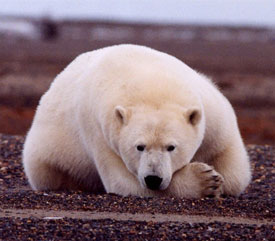No scientists necessary: Bush administration’s new plans regarding endangered species
No scientists necessary: Bush administration’s new plans regarding endangered species
Jeremy Hance, mongabay.com editorial
August 13, 2008
|
|
I would have thought it difficult after eight years to still be surprised by any presidential administration, but the Bush administration has proven unique. After years of delisting endangered species, refusing to list others, and slowly watering down the landmark Endangered Species Act, the Bush administration has finally come out and said it: scientists are superfluous when it comes to saving endangered species. Despite eight years of belittling scientists, I was still surprised they would insult them so blatantly.
The Endangered Species Act currently requires independent scientists from the Fish and Wildlife Service or the National Marine Services to determine if developing projects—such as dams, roads, and mines—would harm endangered species or habitat. The new proposed rules, which do not need to be approved by congress, state that such independent scientific reviews are unnecessary in many cases.
In other words, the government and developers will somehow know whether or not their projects will endanger species without the aid of biologists, and secondly they will have the goodwill to not go-ahead with any project which would negatively affect an endangered species.
 The bald eagle an ESA success story. The raptor has dramatically recovered and is no longer listed as an endangered species |
Essentially, they are proposing a system lacking both checks-and-balances and any independent oversight. Dick Hall, of the Fish and Wildlife Service, even goes so far as to argue that such lack of oversight would be good for endangered species: “We are not being good stewards of our resources when we pursue consultation in situations where the potential effects to a species are either unlikely, incapable of being meaningfully evaluated, wholly beneficial, or pose only a remote risk of causing jeopardy to the species or its habitat”. The problem with such a statement, of course, is how can one be sure of the outcomes of a project—i.e. no harm done to endangered species—without actually doing a study of the project?
There is another tidbit that is fascinating in the rules. Due to the importance of rushing things along, the government agency would have a window of only 60 days to determine whether or not a species will be negatively affected. If the 60 days goes by without a determination, the project will proceed. I am no biologist, but I imagine one needs a little longer than 60 days to study the impacts of large-scale infrastructure on various endangered species and habitats. Perhaps, the 60-day-rule is meant as a way for government agencies to wait out the clock and then proceed with development.
The rule changes would also make it impossible for any animal to be listed under the Endangered Species Act due to the threat climate change. According to numerous recent studies climate change is a leading threat to species such as coral reefs, amphibians, trees, and of course Arctic mammals. But this addition shouldn’t be surprising, since the administration has stated that it now accepts the reality and dangers of global warming, but would also prefer to do nothing about it.

Polar bear. Courtesy of the U.S. Fish and Wildlife Service |
One questions remains: does the Endangered Species Act need fixing? Dick Hall says that the new rules would benefit endangered species, but how much better can the Endangered Species Act become? According to the environmental group Defenders of Wildlife, only nine of 1,800 species protected by the Endangered Species Act have become endangered. One would be hard pressed to find a better success rate in any other government program.
There are a large number of developers that complain that the endangered species act at times hold ups projects, make things proceed slowly, or even stops development altogether. All those living nearly-extinct organisms are a real nuisance. But, wait, isn’t that the point of the Endangered Species Act? When the act was introduced it was decided that preserving biodiversity in America was worth delaying or halting certain projects that could prove the last straw to a species’ livelihood. Essentially, these species possess worth, not necessarily in the monetary sense (though recent studies are increasingly showing how much we depend on the ‘free’ ecosystem services, which themselves are made of thousands of interacting species) but in the sense that all life is purposeful and that we—as one species among millions—do not have the right to send a species to extinction when it can be prevented.
Now, I am not saying that the Endangered Species Act shouldn’t be subject to change or even that it shouldn’t be subject to change now. It is a massive, complex and difficult program, but what the Bush administration is suggesting is not reform or streamlining; they are suggesting that science be stripped from the Act. I am not a scientist, but if I were one, I would think this would make me a little uncomfortable—to say the least. It might even make me want to get together with my colleagues and form an independent group of scientists to stand up to such insults.
Fortunately for endangered species all over America, the media has picked up on this story and run with it. Proving that America and Americans still believe in the importance of conservation, most of the viewpoint from the media has been of disbelief and disagreement. Though I will ad that I have read a few editorials arguing that the changes are right-on. One editorial states that the changes are necessary because the Endangered Species Act never intended to help all endangered species, only the “iconic” ones like the bald eagle—too bad for the other 1,353 species on the list that they are not the nation’s symbol.
There is a period allowing for public comment regarding the change. Usually the American public is given 60 days, but the Bush Administration apparently feels that would just drag things out. So, you have 30 days to make your views heard. Scientists start your e-mails!
A spokesman from Barack Obama’s campaign has said that Obama opposes these changes. Nick Shapiro told the AP that “this 11th-hour ruling from the Bush administration is highly problematic. After over 30 years of successfully protecting our nation’s most endangered wildlife like the bald eagle, we should be looking for ways to improve it, not weaken it. As president, Senator Obama will fight to maintain the strong protections of the Endangered Species Act and undo this proposal from President Bush.”
McCain stated that he had no comment regarding the proposed changes.